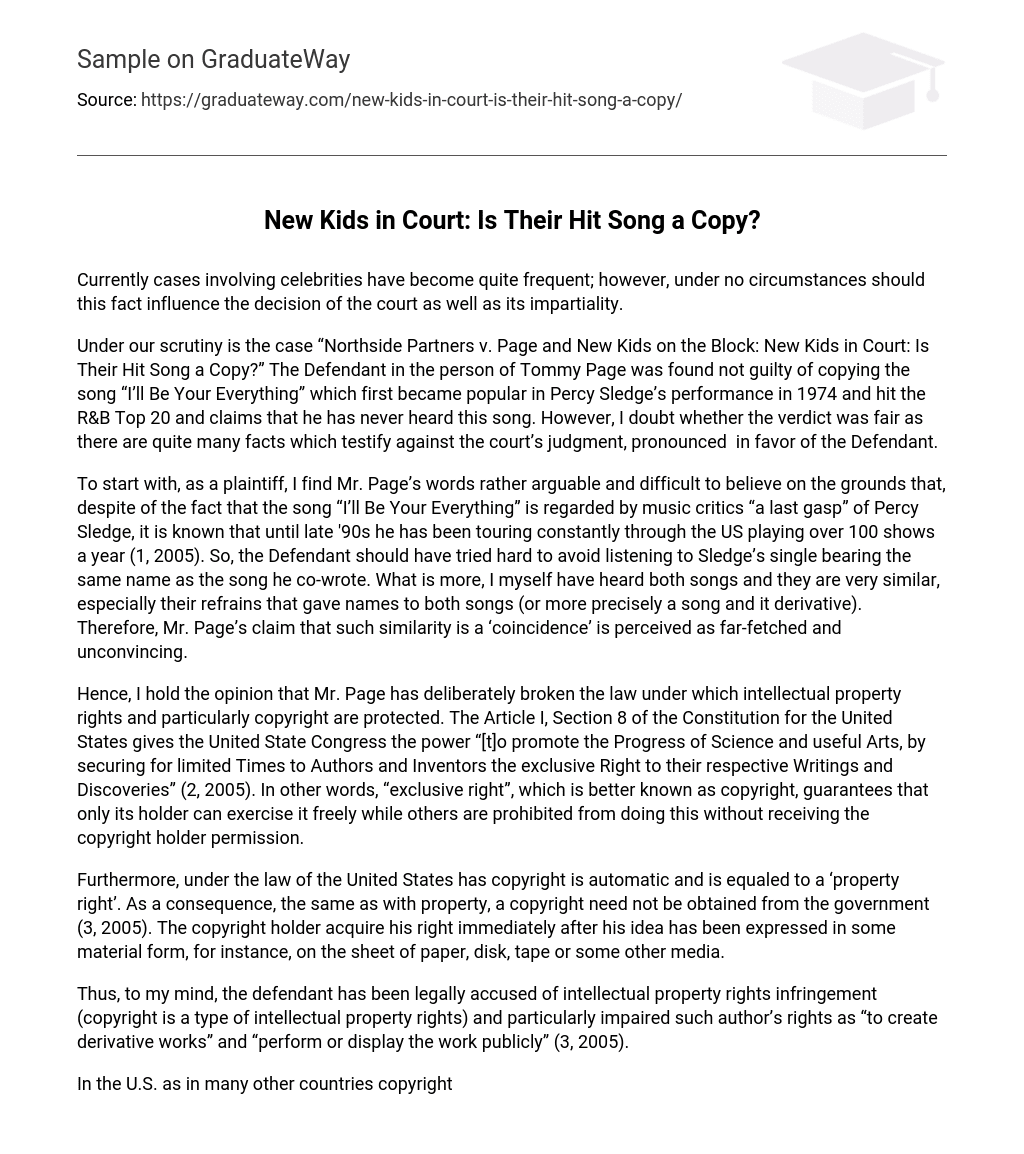Currently cases involving celebrities have become quite frequent; however, under no circumstances should this fact influence the decision of the court as well as its impartiality.
Under our scrutiny is the case “Northside Partners v. Page and New Kids on the Block: New Kids in Court: Is Their Hit Song a Copy?” The Defendant in the person of Tommy Page was found not guilty of copying the song “I’ll Be Your Everything” which first became popular in Percy Sledge’s performance in 1974 and hit the R&B Top 20 and claims that he has never heard this song. However, I doubt whether the verdict was fair as there are quite many facts which testify against the court’s judgment, pronounced in favor of the Defendant.
To start with, as a plaintiff, I find Mr. Page’s words rather arguable and difficult to believe on the grounds that, despite of the fact that the song “I’ll Be Your Everything” is regarded by music critics “a last gasp” of Percy Sledge, it is known that until late ’90s he has been touring constantly through the US playing over 100 shows a year (1, 2005). So, the Defendant should have tried hard to avoid listening to Sledge’s single bearing the same name as the song he co-wrote. What is more, I myself have heard both songs and they are very similar, especially their refrains that gave names to both songs (or more precisely a song and it derivative). Therefore, Mr. Page’s claim that such similarity is a ‘coincidence’ is perceived as far-fetched and unconvincing.
Hence, I hold the opinion that Mr. Page has deliberately broken the law under which intellectual property rights and particularly copyright are protected. The Article I, Section 8 of the Constitution for the United States gives the United State Congress the power “[t]o promote the Progress of Science and useful Arts, by securing for limited Times to Authors and Inventors the exclusive Right to their respective Writings and Discoveries” (2, 2005). In other words, “exclusive right”, which is better known as copyright, guarantees that only its holder can exercise it freely while others are prohibited from doing this without receiving the copyright holder permission.
Furthermore, under the law of the United States has copyright is automatic and is equaled to a ‘property right’. As a consequence, the same as with property, a copyright need not be obtained from the government (3, 2005). The copyright holder acquire his right immediately after his idea has been expressed in some material form, for instance, on the sheet of paper, disk, tape or some other media.
Thus, to my mind, the defendant has been legally accused of intellectual property rights infringement (copyright is a type of intellectual property rights) and particularly impaired such author’s rights as “to create derivative works” and “perform or display the work publicly” (3, 2005).
In the U.S. as in many other countries copyright infringement is considered to be a strict liability tort or crime, which means that prosecutor must “only prove that actus reus or the act of copying was committed by the defendant (what I have already done) but do not need to prove mens rea (the defendant’s guilt) (4, 2005). Still, I regard Mr. Page guilty of committing a crime not the tort. I have already referred to the fact that copyright in legal terms can be compared to the property right. Hence, its outrage, from my standpoint can be equaled to piracy or theft taking into account also the common knowledge fact that “I’ll Be Your Everything” earned a fortune to Mr. Page and New Kids on the Block and made them “the hottest bands on the Billboard charts” (5, 2005).
In a word, I take the view that Tommy Page and New Kids on the Block have copied their hit thus committing a crime and should be punished. The law is equal for all citizens as well as all citizens (regardless their status, walk of life, and fame) are equal in the eyes of the law.
Bibliography
1. Percy Sledge. Bibliography. Retrieved on October 31, 2005 from:
http://www.alamhof.org/sledgep.htm
2. Copyright Act of 1976. Retrieved on October 31, 2005 from:
http://en.wikipedia.org/wiki/United_States_Copyright_Act_of_1976
3. Copyright. Retrieved on October 31, 2005 from:
http://en.wikipedia.org/wiki/Copyright
4. Copyright Infringement. Retrieved on October 31, 2005 from:
http://en.wikipedia.org/wiki/Copyright_infringement
5. Kids R Them by Susan Whitall, News Music Critic. Retrieved on October 31, 2005 from: http://www.geocities.com/SunsetStrip/1291/article.htm





